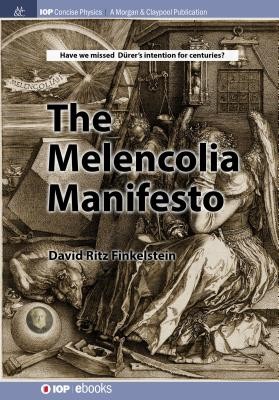
- We will send in 10–14 business days.
- Author: David Finkelstein
- Publisher: IOP Concise Physics
- Year: 2017
- ISBN-10: 1681740265
- ISBN-13: 9781681740263
- Format: 17.8 x 25.4 x 0.3 cm, softcover
- Language: English
- SAVE -10% with code: EXTRA
Reviews
Description
Few artworks have been the subject of more extensive modern interpretation than Melencolia I by renowned artist, mathematician, and scientist Albrecht Dürer (1514). And yet, did each of these art experts and historians miss a secret manifesto that Dürer included within the engraving? This is the first work to decrypt secrets within Melencolia I based not on guesswork, but Dürer's own writings, other subliminal artists that inspired him (i.e., Leonardo da Vinci), the Jewish and Christian Bibles, and books that inspired Dürer (De Occulta Philosophia and the Hieorglyphica).
To read the covert message of Melencolia I is to understand that Dürer was a humanist in his interests in mathematics, science, poetry, and antiquity. This book recognizes his unparalleled power with the burin, his mathematical skill in perspective, his dedication to precise language, and his acute observation of nature. Melencolia I may also be one of the most controversial (and at the time most criminal) pieces of art as it hid Dürer's disdain for the hierarchy of the Catholic Church, the Kaiser, and the Holy Roman Empire from the general public for centuries. This book closely ties the origins of philosophy (science) and the work of a Renaissance master together, and will be of interest for anyone who loves scientific history, art interpretation, and secret manifestos.
EXTRA 10 % discount with code: EXTRA
The promotion ends in 20d.18:40:33
The discount code is valid when purchasing from 10 €. Discounts do not stack.
- Author: David Finkelstein
- Publisher: IOP Concise Physics
- Year: 2017
- ISBN-10: 1681740265
- ISBN-13: 9781681740263
- Format: 17.8 x 25.4 x 0.3 cm, softcover
- Language: English English
Few artworks have been the subject of more extensive modern interpretation than Melencolia I by renowned artist, mathematician, and scientist Albrecht Dürer (1514). And yet, did each of these art experts and historians miss a secret manifesto that Dürer included within the engraving? This is the first work to decrypt secrets within Melencolia I based not on guesswork, but Dürer's own writings, other subliminal artists that inspired him (i.e., Leonardo da Vinci), the Jewish and Christian Bibles, and books that inspired Dürer (De Occulta Philosophia and the Hieorglyphica).
To read the covert message of Melencolia I is to understand that Dürer was a humanist in his interests in mathematics, science, poetry, and antiquity. This book recognizes his unparalleled power with the burin, his mathematical skill in perspective, his dedication to precise language, and his acute observation of nature. Melencolia I may also be one of the most controversial (and at the time most criminal) pieces of art as it hid Dürer's disdain for the hierarchy of the Catholic Church, the Kaiser, and the Holy Roman Empire from the general public for centuries. This book closely ties the origins of philosophy (science) and the work of a Renaissance master together, and will be of interest for anyone who loves scientific history, art interpretation, and secret manifestos.


Reviews